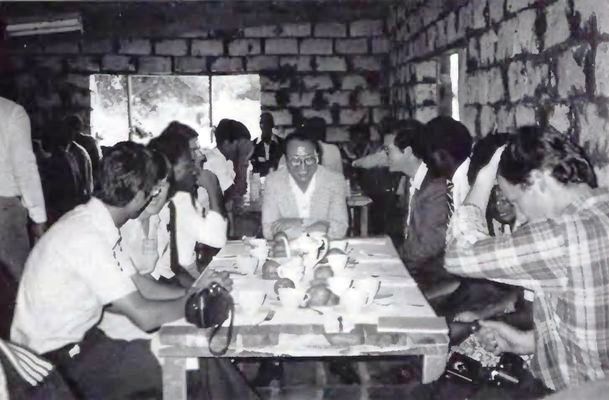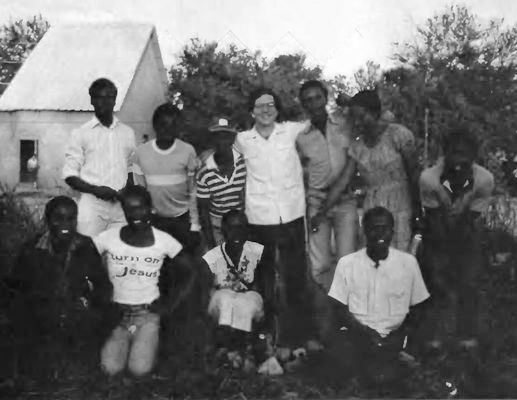![]()
The Words of the Schanker Family
|
|
The Words of the Schanker Family |

For an American who has lived six years in New York City, it was striking just to look from horizon to horizon and see only sky. Africa's wide open spaces and underdeveloped innocence became for me a symbol of her people and all the spiritual potential that is waiting there. As I came to learn over the next two months, Africa is waiting, not only in need, but with much to offer as well: people, resources, culture, and heart... incredible potential.
I had come to conduct a 40-day international training session in Zambia. This was the fifth such training to be held outside of the United States. The training began on January 18 and finished February 26 of this year. With 65 participants from 10 nations (Zambia, Zimbabwe, South Africa, Swaziland, Botswana, Kenya, Cameroon, Holland, Belgium and Japan), this was the largest and most international training session ever held in Africa, as well as the first ever held for English-speaking Africans.
For me the most unforgettable aspect of the training was the heart of brothers and sisters. Our True Parents have found the way to strike gold in the hearts of the people of all nations, races and lands. Africans have much to teach the world about heart, about spirit, and about how to praise God. While cheerful and friendly like many Americans, there is an internal sensitivity quite like the Orient. But far from needing to be measured by other cultures, African brothers and sisters taught me many wordless lessons by their earthiness, their natural humility, innocence and warmth. It was truly my own 40-day training.
The training itself was delayed for three days, mainly because of the unfinished training center. Being built on 15 acres of farmland, it is planned as a large educational center with dormitories, chapel, and facilities not unlike Barrytown. But when we began, the one building which had been semi- completed was still lacking water, electricity, lights, chairs, ceilings (there was a roof), and blackboard. For members from more developed countries such as Zimbabwe, South Africa or Kenya, the accommodations were challenging, while for others, nothing seemed unusual. For me, it was all an exciting new experience anyway. We built and developed our center as we studied: making bricks, tilling soil, plastering walls. Finally we established a simple, efficient training center. One brother, however, had to be assigned entirely to the mission of keeping the lights and electricity on and the water running, which made him one of the busiest staff members.
Our food was almost always based upon "nshima" made from maize (corn) meal cooked to a consistency somewhat thicker than porridge. With different names in different languages, it is the main staple of the diet of most of central and southern Africa. It is like rice to the Orientals or potatoes to the Irish. In Zambia, it is served with meat (when available), vegetables, and gravy, something like a stew. I learned to love it, and I miss it even now. Our head cook was Esnart Mvula, 20 years old and a member for one month; she cooked for 70-80 people over an open charcoal fire three times a day for 40 days. Helping her were two teenage home members who arrived early each morning and left late each night. Like the rest of the Zambian family, they poured out their heart and soul for their African brothers and sisters.
Zambian church leader Robert Williamson determined to make this first training an offering for the participating countries. The Zambian family paid for the entire training, a great financial sacrifice, and members served the training wholeheartedly. The mother of the training was Monique Furuya, originally from Belgium and recently arrived from America. Her investment earned her the affectionate title of Mother Monique," and even now she is bombarded by letters from the training members. Our coordinator was George Chipeta, a Zambian member for five years. The heart of these brothers and sisters brought warmth in the midst of our Spartan surroundings,
As a result, the training was filled with rich experiences. The most popular aspect was internal guidance, which helped members understand more about heavenly tradition and way of life. Members also appreciated any story or testimony about True Parents, whom they love so much but know so little about. Rev. Kwak's visit during the second week was especially meaningful. Through him all of us felt True Parents' love and concern for Africa. Personally, I saw Rev. Kwak from a fresh perspective. He loves Africa very much.
One high point was when Rev. Kwak met with Zambian President Kenneth Kaunda. At that time, we held a 40-minute prayer condition, which for many was the deepest prayer of their lives. Members from ten nations shed tears side by side for Africa, especially for Zambia. We became increasingly aware of God's vision for a united Africa, and of the unique hope and potential in Zambia.
Through fundraising, street preaching, and street cleaning, we could connect ourselves to that heart. A new understanding of the meaning of True Parents, as well as the international feeling gave us all deep sense of being one family. The attitude of African members toward the Principle and training was humbling. It was easy to see their sincerity and appreciation for the truth. Songs were sung wholeheartedly, sometimes for long periods. Many studied through the night, breaking the curfew to prepare for tests. We had an average of one Principle Outline (Level 4) for every three members in the training. One sister cried, feeling unworthy to be here because she could not grasp the Principle well enough. In Africa, almost every member has learned to teach the Principle. People respond well to witnessing, and most members teach their own guests.
The session made quite a public impact as well. Through fundraising, we met government officials and embassy personnel who received us warmly. In street preaching, merely the mention of God or the sound of a joyful song gathered crowds. When we cleaned the streets of the capital, Lusaka, the city council praised our efforts and we ended up on the front page of the newspaper. We were interviewed by newspapers twice. In the meantime we gave concerts on the two main campuses in Zambia and helped to develop CARP there.

But of course the story is not only one of lectures and activities. Just as everywhere else in the world, African brothers and sisters must face the challenges of spiritual life and struggle to become free from evil. In many ways, the problems are the same as anywhere else: selfishness and immorality, difficulties in trusting and communicating, resentment, broken family backgrounds, and much suffering of one kind or another. In Africa, the long history of colonial control, while bringing many benefits, has also injured the sense of value of many African people. To help members overcome the "bwana complex" (bwana means "respected sir," a traditional salutation by Africans to their colonial masters) and develop a sense of value and confidence as a child of God is a major effort. One European member shared his experience of greeting an African brother who responded with: "Hello, Sir." He asked the brother, "Please, don't call me Sir." Our brother replied: "Yes, Sir." I found a most effective response in imitating the traditional subservient salute and greeting each person as "Bwana."
Of course, the colonial history is also a basis for resentment, as is the past history of tribal divisions, which still run deep in some parts of society. Voodoo, with its emphasis on negativity and evil, has had some effect on attitudes and relationships. While the African family unit is traditionally close-knit, it has been weakened by divorce, polygamy, sexual freedom and low position of women. All of these problems are of course reflected in the spiritual struggles of brothers and sisters. And the close family ties also bring about a deep struggle for many members who feel responsible for their family's situation. For some it is difficult to even eat in the center knowing that their parents and loved ones are at home with little or nothing.
But much can be said about great potential as well. I found many precious qualities in the hearts of brothers and sisters. Patience, humility, and a natural feeling for God and the spiritual world seem to come from the powerful relationship with nature. I was often impressed by the sense of community and willingness to help, which was reflected both in experiences with people outside the center and in the spirit of the training. I wish you could meet the brothers and sisters: Zenzele Kunene, Chishala Kaoma, Naftali Machini, Salome Makgeledise, and the rest. Moses Shongwe, Ruth Mumba, Paul Mzumula, Rachel Harawa; each name has an unforgettable story behind it.
Some had lost a brother or friend in a "war of liberation." Others were part of the fighting. Some had been abandoned by parents, others hired out as servants. One sister shared in tears the pain of seeing the parents whom she loved and respected being treated as less than human by European colonists. Her parents were loving and kind Christians who had raised her with faith and morals. The immorality of their humiliation by apartheid wounded and embittered her deeply. Some members, before finding the Principle, leaned toward violence and communism as a means of striking out at the unrighteousness of their situation.
One shy sister shared how she and a group of others had left their country and prepared to return with machine guns to fight for their ideals. Even the communist workers and advisers are throughout Africa, especially reach in the schools and universities. I met and talked with several North Koreans on one campus in Lusaka. With armfuls of propaganda and eagerness to invest money and manpower, communists a seen by many as a great help in the development and liberation of Africa which is the prime concern of leaden and students. Spiritual education as well as substantial investment is desperately necessary to ward off this wolf in sheep's clothing. Clearly our family is the main hope.
I wish that every member in the "developed" world can have such an experience. The Principle became so real, and I could understand Father's desperate concern for the world. And felt the loneliness of wanting to give everything and yet not being easily received at first. It took time for members to open their hearts and begin to trust. I understood that Father must have felt that way many times in many countries.
Africa has been both blessed by Christianity's greatness and victimized by Christianity's failure. I could see how important it is that America fulfills her mission, and I felt the profound responsibility of our movement. We do not need to think of how to restore the failure of the white race, America or Christianity. If we go out with the heart of parents, in the shoes of a servant, as our Parents taught us, we can heal these wounds of history. We are blessed to have an opportunity to pour out our hearts to a waiting and needy world. In each corner of the earth, a unique part of God's heart can be found.